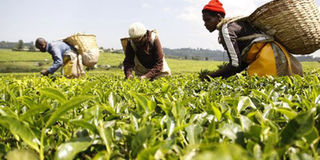Proposed law seeks to cushion tea and coffee farmers

Workers pluck tea leaves at Nandi Tea Estate Limited in Nandi Hills on June 10, 2016. Kiharu MP wants to enhance the functions of the Commodities Fund established under the Crops Act to include payment of minimum returns to farmers when prices of tea and coffee fluctuate downwards. PHOTO | JARED NYATAYA | NATION MEDIA GROUP
What you need to know:
- Kiharu MP Irungu Kang’ata has drafted a Bill that seeks to expand the functions of the Agriculture, Fisheries and Food Authority (Affa) to include prescribing the guaranteed least earnings for the two cash crops.
- The Bill further seeks to establish that the monies (returns to farmers) will be paid out of the Affa fund.
Tea and coffee farmers will have guaranteed minimum returns for their crop if MPs approve a Bill that seeks to amend the Crops Act 2013.
Kiharu MP Irungu Kang’ata has drafted a Bill that seeks to expand the functions of the Agriculture, Fisheries and Food Authority (Affa) to include prescribing the guaranteed least earnings for the two cash crops.
A minimum guarantee in the case of tea and coffee is an initial sum that is paid to producers or growers by the government, irrespective of how the crops perform at auctions.
It is also the initial sum that is paid to the farmer by the buyer (government) irrespective of how the crop performs.
“The payment is to act as an incentive to tea and coffee farmers in order to boost production of the said crops. The Bill also intends to boost production of tea and coffee by farmers through the incentive hence increased returns to farmers,” Mr Kang’ata said.
Mr Kang’ata wants to enhance the functions of the Commodities Fund established under the Crops Act to include payment of minimum returns to farmers when prices of tea and coffee fluctuate downwards.
The Bill further seeks to establish that the monies (returns to farmers) will be paid out of the Affa fund.
“There shall be criteria, which will be used to pay such returns. The criterion will be predetermined by the authority,” the Kiharu MP said in the Bill.
Mr Kang’ata added that tea and coffee estates are currently integrated operations, which grow, process and market the crops in wholesale auctions in Nairobi and Mombasa.
He said that by introducing the minimum returns to farmers, the losses that usually accrue to them will be mitigated.
Tea marketing is usually done by either private agents or agencies of government such as the Kenya Tea Development Authority (KTDA) and the Coffee Board of Kenya.
“In the event of unfavourable marketing conditions, these entities may sell the commodities at low auction prices and may not break even. This may compel the government, through the agencies, to pay the guaranteed minimum return on behalf of the agencies and the private agents incur losses,” he said.
Mr Kang’ata said tea prices in 2016 fluctuated downwards from $3.1 a kilo in January to $2.4 a kilo in April.
“The average prices for the year 2015 increased slightly compared to those of the year 2014 taking the average price for the year 2014 and 2015 to $2.8 per kilogramme.
“Setting the minimum returns at $2.8 per kilo of tea, the government will be required to pay off to farmers any amounts suppose the prices of tea go beyond $2.8 per kilogramme,” he said.
Mr Kang’ata said the prices of coffee vary depending on the type produced. He said on average, they range from Sh21,522 to Sh21,828 per 50-kilogramme bag.
“The amendment intends to curb loses that may be incurred by farmers in the event the prices dwindle downwards. This will cushion the farmers,” he said.





